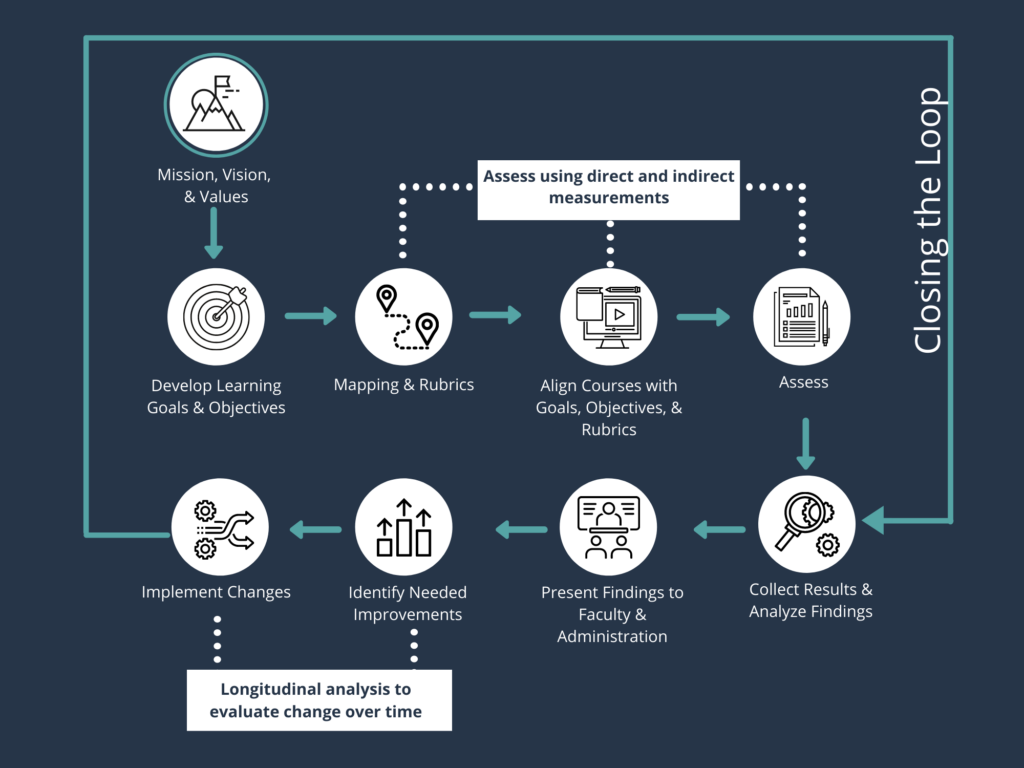Achieving accreditation from the Association of MBAs (AMBA) or the Business Graduates Association (BGA) demonstrates commitment to excellence, innovation, and impact. While AMBA focuses exclusively on accrediting graduate business programs such as MBAs, DBAs, and specialized master’s degrees, BGA takes a broader approach, accrediting institutions and programs at all levels, emphasizing continuous improvement, societal impact, and lifelong learning.
These accreditations require institutions to meet rigorous standards like academic quality, student outcomes, societal impact, and continuous improvement. Meeting such requirements ensures quality but can also be a challenge. This article explores how Peregrine Global Services supports institutions in achieving AMBA and BGA accreditation by addressing critical areas like student readiness, curriculum alignment, and assessment strategies through its Academic Leveling Modules and Business Administration Assessment.
Bridging Student Preparedness with Academic Leveling
Several years ago, a student enrolled in an executive MBA program at a Dutch university faced a challenge common among seasoned professionals returning to school. Despite his extensive experience and strong leadership skills, he encountered difficulties with quantitative subjects such as accounting, business finance, and statistics—areas he hadn’t engaged with in years.
To address this, the university implemented Academic Leveling Modules designed to bridge foundational knowledge gaps. These modules provided engaging, targeted content and assessments that helped him rebuild his confidence and measured his progress through pre- and post-tests. What once felt like a source of anxiety transformed into an area of competence, and he succeeded in those areas of his graduate program. The university then expanded the use of these modules to more students, leading to great success. Faculty members also found them valuable, as the modules made it easier to achieve course outcomes—an area where they often faced challenges due to varying levels of student knowledge.
This student’s experience is not unique. It’s quite common for students to enter a graduate business program with either no business education or an extended period of absence since their undergraduate education.
That is why the accreditation standards set by the Association of MBAs (AMBA) for MBA, MBM, and DBA programs are designed to ensure equitable opportunities for student success, regardless of diverse educational backgrounds (AMBA, 2023). These standards emphasize that it’s the institution’s responsibility to ensure that all admitted students should have a reasonable chance to excel. However, this creates a challenge: candidates often enter programs with varying levels of preparedness, particularly in foundational business concepts. While diversity in academic and professional backgrounds enriches classroom discussions, it can also leave some students struggling to keep pace with coursework. Addressing these gaps early is crucial to prevent academic struggles and promote a smooth, successful learning experience for all.
AMBA allows programs to admit up to 20% of students who do not fully meet standard entry requirements. However, such admissions require justification and clear support plans to ensure these students can succeed. Instructional tools such as Academic Leveling Modules help schools demonstrate to AMBA that they effectively equip students with the foundational knowledge necessary for graduate program success. Similarly, the Business Graduates Association (BGA) aligns these principles through its requirements (e.g., Standard 3.3), highlighting rigorous admissions processes, standardized assessments, and interviews as critical tools for creating a level playing field.

Discover how Academic Leveling Modules make a measurable impact. Download our in-depth case studies and data analysis to see real-world results.
Assessment for AMBA and BGA Accreditation
Achieving accreditation is not a one-time event. It’s an ongoing process that requires consistent attention and adaptation. By shifting from a compliance mindset to a commitment to continuous improvement, institutions can use assessments as a powerful tool for growth and for the underlying purpose of improving educational delivery.
For AMBA and BGA, institutions must establish clear learning outcomes, regularly assess student achievement, and use the results to inform improvements. This cycle of assessing, analyzing, and acting—commonly called “closing the loop”—ensures that institutions actively use data to impact learning outcomes, revise curricula, and align programs with industry needs.

AMBA strongly emphasizes aligning program learning outcomes with assessment practices to ensure students develop broad-based management knowledge and essential skills. Standard 4 specifically requires institutions to provide clear evidence of how these outcomes are achieved. Assessment methods must be rigorous, relevant, and consistently applied across the program to meet this standard, ensuring equity and quality. Institutions seeking AMBA accreditation must:
- Define clear learning outcomes for each program to establish what students are expected to achieve.
- Map these outcomes across curricula and assessment activities, ensuring alignment between teaching and learning goals.
- Use assessment data to identify gaps, refine teaching strategies, and improve curriculum design.
Under AMBA, assessment also serves as a feedback mechanism, providing meaningful insights that guide continuous improvement. Regular program reviews ensure alignment with market needs and use assessment data to enhance the curriculum continuously.
BGA takes a similar but distinct approach, emphasizing the importance of societal and institutional impact through its Continuous Impact Model (CIM). This framework requires institutions to define measurable impact metrics, collect data from multiple stakeholders (students, alumni, employers), and analyze trends to inform program improvement. BGA extends its focus beyond individual program outcomes to encourage institutions to align their strategic goals with broader societal contributions. This alignment supports Assurance of Learning (AoL) principles by ensuring graduates can contribute meaningfully to their fields and communities.
Recognizing the diverse needs of academic programs and student populations, both AMBA and BGA encourage institutions to adopt a variety of assessment strategies, including:
- Formative Assessments: Provide immediate feedback during the learning process, enabling real-time adjustments to teaching strategies.
- Summative Assessments: Evaluate overall achievement at the end of a course or program, such as through capstone projects or comprehensive exams.
- Direct Measures: Standardized tests, portfolios, or other tools to assess actual student performance against established benchmarks.
- Indirect Measures: Alumni surveys, employer feedback, or other tools that capture perceptions and complement direct assessments to provide a holistic view of program impact.
Peregrine Global Services offers a customizable solution that integrates multiple assessment approaches, making it an ideal tool for institutions seeking to meet accreditation requirements. For example, Peregrine’s Business Administration Assessment functions as an external, summative measure that evaluates direct learning outcomes while also incorporating indirect measures using a student survey to provide a well-rounded view of program effectiveness. This tool streamlines the assessment process by addressing multiple requirements simultaneously.
The Role of External Assessments in Business School Accreditation
External assessments conducted by third-party organizations are vital in validating program quality, benchmarking student performance against global or industry standards, and ensuring alignment with accreditation requirements. In contrast, internal assessments—such as course-level evaluations or faculty-led reviews—focus on monitoring student performance, ensuring curriculum alignment, and identifying areas for improvement within the institution as part of ongoing quality assurance processes.
Although neither AMBA nor BGA explicitly requires external assessments, they provide several significant advantages that enhance program credibility and align institutions more closely with accreditation values.

For AMBA accreditation, external assessments are helpful in maintaining the high standards expected of Master’s-level programs. They objectively measure the rigor of programs, ensuring students acquire the necessary competencies to succeed in their careers. By incorporating external assessments, institutions can validate their programs’ quality and demonstrate that graduates are well-prepared for the workforce. This focus on evidence-based outcomes is particularly important to AMBA, as it prioritizes clear documentation of graduate achievement.
Another advantage of external assessments for AMBA-accredited programs is the ability to engage in international benchmarking. By comparing student performance against global standards, institutions can highlight the international competitiveness of their programs. This global perspective reinforces AMBA’s mission to promote graduate business education excellence and ensure that programs meet world-class standards.
For BGA accreditation, the benefits of external assessments extend beyond individual achievement to address societal impact and knowledge creation. These assessments provide a structured framework to evaluate and showcase how graduates are equipped with the skills needed to make meaningful contributions to society. By identifying areas where curricula can be refined, external assessments also support continuous improvement, enabling institutions to align their programs more closely with BGA’s focus on societal impact, lifelong learning, and responsible management.
Implementation and Next Steps
For institutions interested in Peregrine’s assessment tools, implementation begins with a consultation to identify program needs. Peregrine offers learning management integration, online delivery, security features, customizability, student survey, 16 different reports and all your raw data, training and support.
Meeting AMBA and BGA accreditation standards requires a commitment to excellence and continuous improvement. Peregrine’s assessment solutions provide the tools to bridge student readiness gaps, align curriculum with accreditation criteria, and leverage data for transformative growth.
Ready to take your assessment processes to the next level? Contact Peregrine Global Services today to discover how our customizable solutions can support your journey toward accreditation and quality education.
References:
Association of MBAs (AMBA). (n.d.). Accreditation Criteria.
Business Graduates Association (BGA). (n.d.). Charter and Accreditation.


